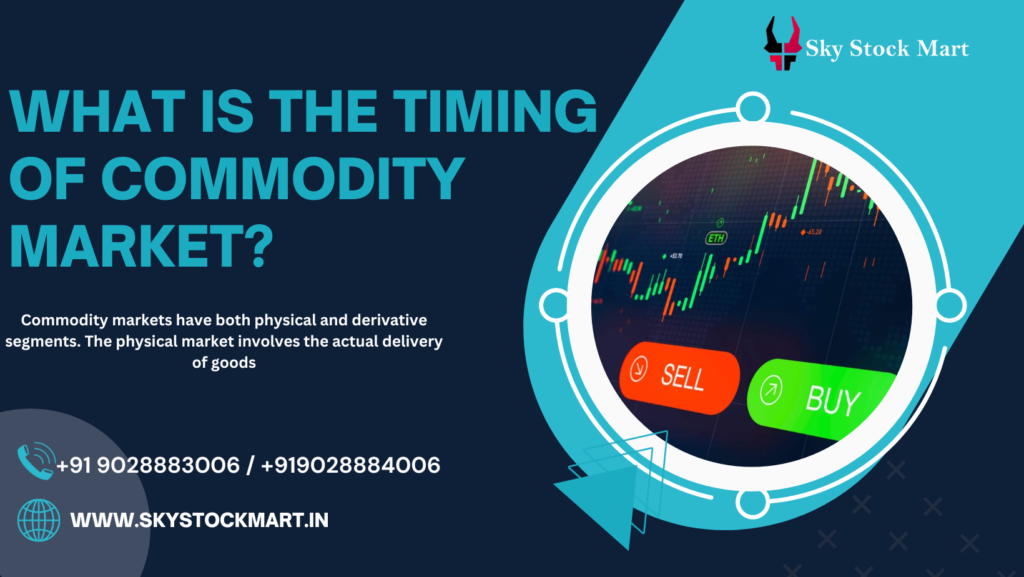What is the Timing of Commodity Market?
Introduction
The commodity market plays a significant role in the global economy, providing a platform for the trading of various raw materials and primary goods. To participate effectively in commodity trading, it’s essential to understand the market’s operating hours and timing. In this blog, we will delve into the timing of the commodity market, including its trading hours, global exchanges, and the factors that influence commodity market timing.
click here to open free demat account
Understanding Commodity Markets
Commodity markets are where raw materials and primary goods like metals, energy products, agricultural products, and more are bought and sold. These markets serve as a crucial component of the supply chain and offer a way for producers, consumers, What is the Timing of Commodity Market? and investors to manage price risk.
Commodity markets have both physical and derivative segments. The physical market involves the actual delivery of goods, while the derivative market is where futures and options contracts are traded, What is the Timing of Commodity Market? allowing participants to speculate on price movements without taking physical possession of the commodities.
click here to open free demat account
Global Commodity Exchanges
Commodity markets operate on various global exchanges, and their trading hours can differ based on location and the specific commodity. Some of the major commodity exchanges worldwide include:
- Chicago Mercantile Exchange (CME): CME Group is one of the largest commodity exchanges, where products like crude oil, gold, and agricultural commodities are traded.What is the Timing of Commodity Market? The trading hours vary depending on the specific commodity.
- Intercontinental Exchange (ICE): ICE operates several commodity futures markets, What is the Timing of Commodity Market? including those for energy, soft commodities, and more. These markets have their own trading hours.
- Multi Commodity Exchange of India (MCX): In India, MCX is a prominent commodity exchange. Trading hours are typically set to accommodate Indian Standard Time (IST).
Trading Hours
Commodity markets have diverse trading hours, reflecting the global nature of the commodities being traded. These hours can be influenced by various factors, such as geographical location, market regulations, and the specific commodity’s characteristics. Here are some key points to consider:
- Continuous Trading: Many commodity markets, particularly energy and financial futures, operate with continuous trading during the trading week. This means they are open for a significant portion of the day, with brief breaks.
- Trading Sessions: Some markets have multiple trading sessions. For example, they may have a day session and a night session, allowing traders from different time zones to participate.
- Weekend Breaks: Most commodity markets are closed on weekends, What is the Timing of Commodity Market? providing a break for traders and allowing the market to reset.
- Holidays: Commodity markets often observe national holidays, which can affect trading hours.
- Seasonal Variations: The trading hours for agricultural commodities may vary based on planting and harvesting seasons.
It’s crucial to check the trading hours of the specific commodity or exchange you are interested in, as they can change over time due to market conditions and regulatory adjustments.
click here to open free demat account
Factors Influencing Commodity Market Timing
The timing of commodity markets is influenced by several factors:
- Global Demand: The hours of operation may align with the major consumer markets for specific commodities. For instance, oil markets may coincide with major consumption regions.
- Time Zones: Commodity exchanges in different parts of the world have trading hours that align with their local time zones.
- Market Liquidity: Trading hours are often structured to maximize liquidity,What is the Timing of Commodity Market? enabling traders to enter and exit positions with ease.
- Market Regulations: Government and regulatory authorities can influence trading hours to ensure orderly and fair market operations.
Conclusion
Understanding the timing of the commodity market is essential for anyone looking to trade or invest in commodities. Different commodities and exchanges have varying trading hours, and these hours are influenced by a combination of global demand,What is the Timing of Commodity Market? time zones, and regulatory considerations. It’s crucial to be aware of these nuances to make informed decisions when participating in the commodity market. Whether you are a producer looking to hedge your risks or an investor seeking to diversify your portfolio, being well-informed about commodity market timing is a key to success in this dynamic financial arena


